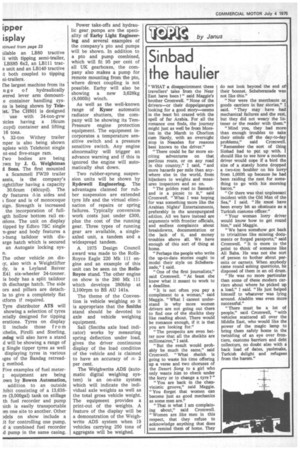Sinbad the haulier
Page 26

If you've noticed an error in this article please click here to report it so we can fix it.
"WHAT a disappointment these travellers' tales from the Near East have been !" said Maggie's brother Cromwell. "None of the drivers—or their doppelgangers looking for a good story—seems in the least bit crazed with the spell of far Arabia. For all the romance one finds, the journey might just as well be from Moreton in the Marsh to Cborlton cum Hardy, with an overnight stop in Neasden for reasons best known to the driver."
"There could be far more exciting adventures on that perilous route, or on any road in this country," I said, "and more hazards per mile than anywhere else in the world, from hijackers to weights and measures inspectors and so on.
"The golden road to Samarkand is a picnic to it," said Cromwell. "What I was hoping for was something more like the Arabian Nights' Entertainments, preferably in the unexpurgated ed:tion. All we have instead are arguments with frontier officials, and endless complaints about breakdowns, documentation or the lack of it, and money troubles above all. We have enough of this sort of thing at home.
"Perhaps the people who write the up-to-date stories ought to model their style on Scheherazade," I said.
" One of the first journalists," said Cromwell. "At least she knew what it meant to work to a deadline.
"It is not often you pay a compliment to a woman," said Maggie. "What I cannot understand is why more women drivers are not going out there to find one of the sheikhs they like reading about. There would be romance enough, if it is that you are looking for."
" The prospects are even better now that all the Sheikhs are millionaires," I said.
"But the result would probably be much the same," said Cromwell. "What sheikh is going to waste his time offering up a verse and two choruses of the Desert Song to a girl who only wants him to check under the lorry or to change a tyre ?"
"You are back in the chauvinistic groove," said Maggie. "You forget that women can become just as good mechanics as some men are."
"That is what I am complaining about," said Cromwell. "Women are like men in this respect, that they refuse to acknowledge anything that does not remind them of home. They do not look beyond the end of their 'bonnet. Scheherazade was not like this."
"Nor were the merchants °xi goods carriers in her stories," I said. "They may have had mechanical failures and the rest, but they did not weary the listener or the reader with them."
"Mind you, they had more than enough troubles to take their minds off the day-to-day problems," said Cromwell. "Remember the sort of thing Sinibad had to put up with. I should like to see how a modern driver would cope if a bird the size of a stately home dropped a two-ton boulder on his lorry, from 1,000ft up because he had been raiding the nest for something to go with his morning bacon."
"Or there was that unpleasant incident with the Old Man of the Sea," I said. "He must have been every bit as obstinate as a Turkish customs officer."
"Your woman lorry driver would know how to get round him," said Maggie.
"We have somehow got back to trivialities like missing documents or forged passports," said Cromwell. "It is more to the point to think of someone like Ali Baba. He was not the sort of person to bother about permits or carnets. When anybody came round asking questions, he disposed of them in an oil drum.
"He was no more particular than some of these modern carriers about where he picked up a load," I said. "He just helped himself to Whatever was lying around. Aladdin was even more successful."
"There must be a lot of people," said Cromwell, "with vehicles scattered all over the Middle East, who would like the power of the magic lamp to bring them safely home in the twinkling of an eye over frontiers, customs barriers and debt collectors, no doubt also with a back load af dates, yashmaks, Turkish delight and refugees from the harem."




















































































